|
|
|
Sort Order |
|
|
|
Items / Page
|
|
|
|
|
|
|
| Srl | Item |
| 1 |
ID:
154560
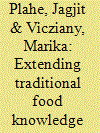

|
|
|
|
|
| Summary/Abstract |
Small farmers, who are normally dependent on marketing intermediaries, have formed themselves into co-operatives in the Indian states of Telangana, Andhra Pradesh and Maharashtra and have started to sell their produce directly to consumers via retail outlets, the Internet, urban franchises, mobile vans, rural food hubs and as branded products. The key engine for this marketing experiment is the Sahaja Aharam Producer Company Limited (SAPCO), a producer organisation. SAPCO has tried to create new supply chains that guarantee that the produce it sells complies with the quality standards needed to certify the foods as ‘organic’. SAPCO is an initiative of the Centre for Sustainable Agriculture (CSA) which has taken up the bulk of the financial and administrative burden of managing the company. The revival of traditional knowledge for organic farming and the marketing of organic produce has invariably required the intervention of external agents such as CSA. In the final section, we assess the achievements of SAPCO from the viewpoint of the small farmers who belong to the producer co-operatives that make up SAPCO's membership. Our key research question is whether it has been possible to scale up the production and marketing of small farmers’ output and create a new supply chain independent of local intermediaries.
|
|
|
|
|
|
|
|
|
|
|
|
|
|
|
|
| 2 |
ID:
154559
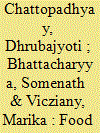

|
|
|
|
|
| Summary/Abstract |
This multi-disciplinary paper brings together two bodies of evidence that, to our knowledge, have not before been combined: literature about the efficient functioning of the East Kolkata Wetlands in the production of fish is juxtaposed against scientific research that documents the heavy metal pollution of those Wetlands caused by industries such as tanneries. Our primary question is whether it is safe to eat the fish (and other produce) of the Wetlands; a related issue is to assess the strengths and limitations of traditional knowledge. In discussing what the farmers know and what the scientists know, we have placed our work in the context of a framework developed by Richards in 1979. Our conclusions suggest that the expertise of the farmers and the expertise of the scientists can be brought together.
|
|
|
|
|
|
|
|
|
|
|
|
|
|
|
|
| 3 |
ID:
154555
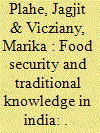

|
|
|
|
|
| Summary/Abstract |
In this first paper, we explain why traditional knowledge is an important theme in the study of Indian agriculture, especially given the crises routinely facing poor, smallholder farmers. We begin with an overview of some of the key authors who have written about the problems facing small farmers both within and outside India. Different authors have focused on different aspects of the benefits that can be derived from the local knowledge and skills of farmers, but these do not always pertain to organic farming. Our interest in organic farming is specifically about ‘traditional’ knowledge. With the industrialisation of agriculture in India and elsewhere, many poor, small farmers have been deskilled and placed into vulnerable positions. Traditional knowledge has been undermined, overwhelmed or has survived only in fragments. How ‘traditional knowledge’ might be retrieved, reinvented, reintroduced and modified so as to create a farmer-driven, sustainable and biodiverse agriculture is our concern. In the final section of this paper, we analyse the four situations we have been working on as examples of the possibilities and challenges facing the revival of ‘traditional knowledge’ in the villages of Kolkata, central India and Sikkim.
|
|
|
|
|
|
|
|
|
|
|
|
|
|
|
|
| 4 |
ID:
154551
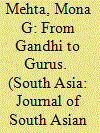

|
|
|
|
|
| Summary/Abstract |
This article compares the public sphere of gurus (‘guru-sphere’) in contemporary Gujarat and that of Gandhi historically as important sites of political contestation. It argues that despite their common use of religious idioms to convey political ideas, Gandhi and the gurus authorise radically different political projects with divergent conceptions of the Hindu subject and Indian polity. The discursive activities of the guru-sphere have helped forge a dominant consensus that endorses Hindutva politics. Operating within a democratic civil society and borrowing from Gandhian idioms, gurus have actively challenged key constitutional values derived from the Gandhian public sphere. The study reveals the paradoxical tendency of Gujarat's public sphere to produce hegemonic monologues over pluralistic dialogues, not in the absence of, but through the institutional mechanisms of, deliberative democracy.
|
|
|
|
|
|
|
|
|
|
|
|
|
|
|
|
| 5 |
ID:
154558
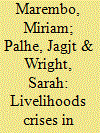

|
|
|
|
|
| Summary/Abstract |
The Vidarbha region in Maharashtra, India, home to 3.4 million smallholder farmers, is a major cotton-producing region in one of the wealthiest Indian states. However, between 1995 and 2013, more than 60,000 farmers took their own lives. Many of these suicides have been linked to extreme debt created by the expensive mono-cropping of Bt cotton. Some farming households have responded to these pressures by abandoning Bt cotton growing and turning to sustainable agriculture using traditional mixed-cropping methods. Yet the question remains: have the changes produced better livelihoods in Vidarbha? Using a food sovereignty framework, we assess the impact of these changes through an analysis of a 200-household survey across six districts in Vidarbha. We also explore the meaning of food sovereignty for those who practise it, seeking to better understand some of the complexities and experiences associated with the term.
|
|
|
|
|
|
|
|
|
|
|
|
|
|
|
|
| 6 |
ID:
154552
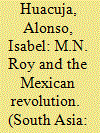

|
|
|
|
|
| Summary/Abstract |
This essay examines the Indian anti-colonial and Leftist activist M.N. Roy's political work in Mexico from 1918 to 1920. It argues that Roy's sojourn in revolutionary Mexico—and in particular the friendships he made there with Leftist intellectuals, some Mexican, many newcomers to Mexico—played an important role in shaping his political trajectory. Not only did Roy become a communist in Mexico, but he and his colleagues, concerned with the ‘universal’ struggle of the working class, dismissed ideas about national identity brewing during the Mexican Revolution and its aftermath. Roy's distaste for national pride also defined his later political work in India.
|
|
|
|
|
|
|
|
|
|
|
|
|
|
|
|
| 7 |
ID:
154557
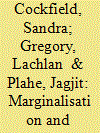

|
|
|
|
|
| Summary/Abstract |
India is in the grip of an agrarian crisis. Economic, social, environmental and political forces have adversely affected the relationship between the small-scale primary producer and the production process. In the context of this crisis, traditional knowledge-inspired food systems have given rise to ‘islands of success’ that have allowed small and marginal farmers to reclaim their livelihoods across the country. In this paper, we analyse three different islands of success using an agro-ecological framework, arguing that such islands of success based on traditional knowledge are becoming an increasingly necessary approach to agriculture. However, political will, political engagement and effective policies that support traditional knowledge in agriculture are required for these islands of success to become waves of change.
|
|
|
|
|
|
|
|
|
|
|
|
|
|
|
|
| 8 |
ID:
154556


|
|
|
| 9 |
ID:
154553
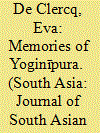

|
|
|
|
|
| Summary/Abstract |
This paper discusses the lengthy eulogies (praśasti) framing the Apabhraṃśa-language compositions of Raïdhū, a Digambara Jaina from early-fifteenth-century Gwalior. In these praśastis, the patron of the work, his family and their noteworthy deeds are immortalised by the poet. Many of these patrons, all of them merchants, had ancestors living in Delhi, here named Yoginīpura, who seem to have migrated to Gwalior and elsewhere around the time of Timur's sack of Delhi in 1398. Despite its frequent mention, Yoginīpura itself is nowhere described by Raïdhū, possibly in order to avoid stirring up memories of Timur's onslaught just decades prior.
|
|
|
|
|
|
|
|
|
|
|
|
|
|
|
|
| 10 |
ID:
154549
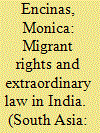

|
|
|
|
|
| Summary/Abstract |
This paper provides a new and original perspective on the plight of migrants in India. It incorporates an in-depth and practical analysis of Indian legal policies through the lens of migrant and refugee rights. In examining the extra-legal provisions operating in two of India's borderland states—Assam and Jammu & Kashmir—I show how special legal exemptions in Indian law inherently undermine efforts to protect migrant rights. I argue that these extraordinary laws hinder pathways to justice in three distinct ways: by circumventing international principles of non-refoulement; challenging the jurisdiction of India's Supreme Court; and delegitimising migrant-friendly laws. In highlighting an often overlooked aspect of migrants’ rights issues, this paper brings the human element of India's regional border disputes and related legal mechanisms to the fore.
|
|
|
|
|
|
|
|
|
|
|
|
|
|
|
|
| 11 |
ID:
154547


|
|
|
|
|
| Summary/Abstract |
This article looks at three iconic Assamese films, Joymoti (1935), Runumi (1953) and Maniram Dewan (1964), which have been restored in the last two decades. Using a broad definition of the term restoration, this article argues that these three restorations give us an opportunity to read against the grain of the prescriptive account of Assamese cinema produced through local film societies and critics as well as national-level film journals. The restored versions of the three films provide us with a way to deconstruct the myths of purity associated with such pioneering films and enable a critical look at the politics of language and region that are so deeply inscribed within the act of restoration.
|
|
|
|
|
|
|
|
|
|
|
|
|
|
|
|
| 12 |
ID:
154554
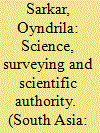

|
|
|
|
|
| Summary/Abstract |
This article traces the journeys of and controversies surrounding the Schlagintweit brothers in ‘India and High Asia’. The brothers were Alpine glaciologists from Germany who were invited by the East India Company in 1854 to complete the Magnetic Survey of the Indian subcontinent on the recommendation of Alexander von Humboldt. This article discusses how the Schlagintweit brothers became the subject of controversy, and how they vanished from the record of the history of surveying as abruptly as they had emerged. Their story calls into question established historiographical narratives about ‘colonial science’ and ‘Western science’ in the subcontinent.
|
|
|
|
|
|
|
|
|
|
|
|
|
|
|
|
| 13 |
ID:
154550


|
|
|
|
|
| Summary/Abstract |
This paper argues that constitutions can play an important role in fostering a degree of political co-operation if they are useful to the political strategies of both rulers and ruled. Viewing Pakistan's constitutional documents as ‘strategic constitutions’ helps to explain the timing and content of constitutional reform, but also the seemingly contradictory provisions relating to the Constitutions’ commitment to Islam. A strategic constitution functions to settle political exigencies rather than committing itself to the task of putting fundamental issues of state to rest. Often, the constitutional domain substitutes for other conventional channels of politics which may be inaccessible, or deliberately sidestepped, in order to achieve particular political goals.
|
|
|
|
|
|
|
|
|
|
|
|
|
|
|
|
| 14 |
ID:
154548


|
|
|
|
|
| Summary/Abstract |
In the last decade, large numbers of indigenous youth from the uplands of Northeast India have migrated to metropolitan cities across the country. Many end up in the new service sector, getting jobs in high-end restaurants, shopping malls and spas. The demand for their labour is due to their un-Indian ‘exotic Asian’ appearance and a reputation for being hardworking and loyal. Such labour market value is a remarkable reversal of their position considering the earlier colonial stereotypes of their savagery and disobedience, reproduced through the de-politicisation of their armed insurrections during the post-colonial period. This paper addresses their daily experiences of vulnerability and marginality as well as the freedom and aspirations that a migratory life seem to engender.
|
|
|
|
|
|
|
|
|
|
|
|
|
|
|
|
|
|
|
|
|